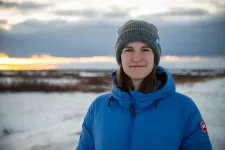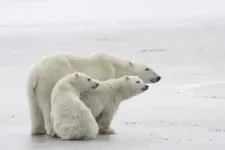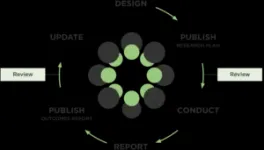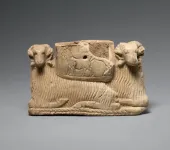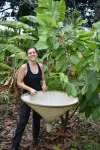(Press-News.org) U of T Scarborough researchers have directly linked population decline in polar bears living in Western Hudson Bay to shrinking sea ice caused by climate change.
The researchers developed a model that finds population decline is the result of the bears not getting enough energy, and that’s due to a lack of food caused by shorter hunting seasons on dwindling sea ice.
“A loss of sea ice means bears spend less time hunting seals and more time fasting on land,” says Louise Archer, a U of T Scarborough postdoc and lead author of the study.
“This negatively affects the bears’ energy balance, leading to reduced reproduction, cub survival and, ultimately, population decline.”
The “bio-energetic” model developed by the researchers tracks the amount of energy the bears are currently getting from hunting seals and the amount of energy they need in order to grow and reproduce. What’s unique about the model is that it follows the full lifecycle of individual polar bears — from cub to adulthood — and compares it to four decades of monitoring data from the Western Hudson Bay polar bear population between 1979 and 2021.
During this period, the polar bear population in this region has declined by nearly 50 per cent. The monitoring data shows the average size of polar bears is also in decline. The body mass of adult females has dropped by 39kg (86lbs) and one-year-old cubs by 26kg (47lbs) over a 37-year period.
The researchers’ model provides a close match to the monitoring data, meaning it provides an accurate assessment of what is happening and will continue to happen to the polar bear population if it keeps experiencing sea ice loss and a greater amount of time in energy deficit.
“Our model goes one step further than saying there’s a correlation between declining sea ice and population decline,” says Péter Molnár, an associate professor in the Department of Biological Sciences at U of T Scarborough and co-author of the study.
“It provides a mechanism that shows what happens when there is less ice, less feeding time and less energy overall. When we run the numbers, we get a near one-to-one match to what we’re seeing in real life.”
Polar bear mom and cubs particularly vulnerable
The researchers, which include co-authors from Environment and Climate Change Canada, noted that cubs face the brunt of these climate-induced challenges.
Archer says that shorter hunting periods result in mothers producing less milk, which jeopardizes cub survival. The cubs face reduced survival rates during their first fasting period if they fail to gain enough weight.
Mothers are also having fewer cubs. Monitoring data shows cub litter sizes have dropped 11 per cent compared to almost 40 years ago, and mothers are keeping their cubs longer because they aren’t strong enough to live on their own.
“It’s pretty simple — the survival of cubs directly impacts the survival of the population,” says Archer, whose research is funded through a Mitacs Elevate postdoctoral fellowship and the non-profit organization Polar Bears International.
Broader applications for the model
Western Hudson Bay has long been considered a bellwether for polar bear populations globally, and as the Arctic warms at a rate four times faster than the global average, the researchers warn of similar declines in other polar bear populations.
“This is one of the southernmost populations of polar bears, and it’s been monitored for a long time, so we have very good data to work with,” says Molnár, who is an expert on how global warming impacts large mammals.
“There’s every reason to believe what is happening to polar bears in this region will also happen to polar bears in other regions, based on projected sea ice loss trajectories. This model basically describes their future.”
The study, which is published in the journal Science, received funding from the Natural Sciences and Engineering Research Council of Canada and the Canada Foundation for Innovation.
END
Polar bear population decline the direct result of extended ‘energy deficit’ due to lack of food
Study finds polar bears are struggling to get enough to eat in face of dwindling sea ice due to climate change
2025-01-30
ELSE PRESS RELEASES FROM THIS DATE:
Lifecycle Journal launches: A new vision for scholarly publishing
2025-01-30
(Charlottesville, VA, Jan. 30, 2025) – The Center for Open Science (COS) is excited to announce that Lifecycle Journal, a 3-year research and development pilot on a new model of scholarly communication, is now open for submissions. Lifecycle Journal reimagines scholarly publishing in line with scholarly values of rigor, transparency, sharing, correction, and community evaluation. Lifecycle Journal offers a dynamic, community-driven approach to scholarly publishing, providing a new experience for authors, reviewers, and readers to critically engage with research throughout the entire research lifecycle.
The traditional ...
Ancient DNA analyses bring to life the 11,000-year intertwined genomic history of sheep and humans
2025-01-30
Sheep have been intertwined with human livelihoods for over 11,000 years. As well as meat, their domestication led to humans being nourished by their protein-rich milk and clothed by warm, water-resistant fabrics made from their wool.
Now, an international and interdisciplinary team of researchers led by geneticists from Trinity College Dublin and zooarchaeologists from LMU Munich and the Bavarian State Collections of Natural History (SNSB) has deciphered the prehistoric cultural trajectory of this species by analysing 118 genomes recovered from archaeological bones dating across 12 millennia and stretching from Mongolia to ...
Climate change increases risk of successive natural hazards in the Himalayas
2025-01-30
An international study has investigated the causes and impacts of the devastating flood disaster in the Himalayas in October 2023, which destroyed large areas along and surrounding the Teesta River in Sikkim, India. A research team from nine countries, including researchers from the University of Zurich (UZH), analyzed the complex drivers, causes and consequences of this flood cascade and reconstructed the exact time of its onset.
Massive damage caused by tsunami wave
On 3 October 2023, approximately 14.7 million cubic meters of frozen ...
From bowling balls to hip joints: Chemists create recyclable alternative to durable plastics
2025-01-30
ITHACA, N.Y. – Cornell University researchers have developed a recyclable alternative to a durable class of plastics used for items like car tires, replacement hip joints and bowling balls.
Known as thermosets, this type of plastic boasts a “crosslinked polymer” chemical structure that guarantees longevity but has also made these petrochemical-based materials – which comprise 15%-20% of all polymers produced – impossible to recycle.
“Currently, zero percent of the world’s thermoset materials are recycled – they’re either incinerated ...
Promoting cacao production without sacrificing biodiversity
2025-01-30
The productivity of cacao trees decreases with time, forcing farmers to renew their plantations by either cutting down the old trees or establishing a new crop elsewhere. Frequently, new plantations are established in areas of the forest that are thinned out to accommodate new, young cacao trees. However, this comes with high economic and ecological costs. An alternative approach is to graft highly productive and native cultivars onto the existing older cacao trees. An international team led by scientists of the University of Göttingen found that cacao grafting is a useful measure to rejuvenate cacao plants, increasing their yield and profits with minimal impact on biodiversity. The ...
New £2 million project to save UK from food shortages
2025-01-30
Anglia Ruskin University (ARU) is leading a new £2 million initiative to help prevent food shortages that could potentially trigger civil unrest in the UK.
The project, called Backcasting to Increase Food System Resilience in the UK, is being led by experts from Anglia Ruskin’s Global Sustainability Institute and has received £2,048,461 in funding from the Biotechnology and Biological Sciences Research Council, part of UK Research and Innovation (UKRI).
Building on recent research that found that over 40% of food experts believe widespread civil unrest linked to food shortages, such as demonstrations and violent looting, is possible or likely in the UK within the next 10 ...
SCAI mourns Frank J. Hildner, MD, FSCAI: A founder and leader
2025-01-30
The Society for Cardiovascular Angiography and Interventions (SCAI) and the interventional cardiology community mourn the passing of Frank J. Hildner, MD, FSCAI, a founding member and past president (1989-90) of SCAI.
“Dr. Frank Hildner laid the foundation for SCAI’s growth and success. His visionary leadership helped guide SCAI through its formative years, ensuring it would become the trusted home for interventional cardiology. We are deeply grateful for his contributions and will continue to honor his legacy,” said SCAI President James B. Hermiller, MD, MSCAI.
Recognizing the need for a dedicated platform for interventional cardiologists, Dr. ...
New diagnostic tool will help LIGO hunt gravitational waves
2025-01-30
RIVERSIDE, Calif. -- Finding patterns and reducing noise in large, complex datasets generated by the gravitational wave-detecting LIGO facility just got easier, thanks to the work of scientists at the University of California, Riverside.
The UCR researchers presented a paper at a recent IEEE big-data workshop, demonstrating a new, unsupervised machine learning approach to find new patterns in the auxiliary channel data of the Laser Interferometer Gravitational-Wave Observatory, or LIGO. The ...
Social entrepreneurs honored for lifesaving innovations
2025-01-30
DALLAS, Jan. 30, 2025 – An organization that developed a health monitor to continuously track blood oxygen levels and one that launched a digital health platform to provide peer support to people recovering from addiction are the recipients of the 2025 Impact with Heart awards from the American Heart Association. The Association, a global force changing the future of health for all, annually recognizes leaders in innovative entrepreneurship that supports equitable health outcomes.
According to the just released American Heart Association 2025 Heart Disease & Stroke Statistics report, heart disease continues ...
Aspects of marriage counseling may hold the key to depolarizing, unifying the country, study finds
2025-01-30
Research has shown that polarization undermines democracy by driving citizens to prioritize partisan preferences over democratic principles, encourages democratic gridlock and threatens democratic attitudes and norms, such as tolerance for opposition.
Today, Americans are grappling with deep political divides, often seeing those on the other side as untrustworthy, unpatriotic and misinformed — a rift that threatens democracy.
Could marriage counseling hold the key to a more unified country?
A recent study, published in Political Behavior and co-authored by Laura Gamboa, an assistant professor of democracy and global affairs at the Keough ...
LAST 30 PRESS RELEASES:
Night lights can structure ecosystems
A parasitic origin for the ribosome?
A gold-standard survey of the American mood
Tool for identifying children at risk of speech disorders
How Japanese medical trainees view artificial intelligence in medicine
MambaAlign fusion framework for detecting defects missed by inspection systems
Children born with upper limb difference show the incredible adaptability of the young brain
How bacteria can reclaim lost energy, nutrients, and clean water from wastewater
Fast-paced lives demand faster vision: ecology shapes how “quickly” animals see time
Global warming and heat stress risk close in on the Tour de France
New technology reveals hidden DNA scaffolding built before life ‘switches on’
New study reveals early healthy eating shapes lifelong brain health
Trashing cancer’s ‘undruggable’ proteins
Industrial research labs were invented in Europe but made the U.S. a tech superpower
Enzymes work as Maxwell's demon by using memory stored as motion
Methane’s missing emissions: The underestimated impact of small sources
Beating cancer by eating cancer
How sleep disruption impairs social memory: Oxytocin circuits reveal mechanisms and therapeutic opportunities
Natural compound from pomegranate leaves disrupts disease-causing amyloid
A depression treatment that once took eight weeks may work just as well in one
New study calls for personalized, tiered approach to postpartum care
The hidden breath of cities: Why we need to look closer at public fountains
Rewetting peatlands could unlock more effective carbon removal using biochar
Microplastics discovered in prostate tumors
ACES marks 150 years of the Morrow Plots, our nation's oldest research field
Physicists open door to future, hyper-efficient ‘orbitronic’ devices
$80 million supports research into exceptional longevity
Why the planet doesn’t dry out together: scientists solve a global climate puzzle
Global greening: The Earth’s green wave is shifting
You don't need to be very altruistic to stop an epidemic
[Press-News.org] Polar bear population decline the direct result of extended ‘energy deficit’ due to lack of foodStudy finds polar bears are struggling to get enough to eat in face of dwindling sea ice due to climate change
